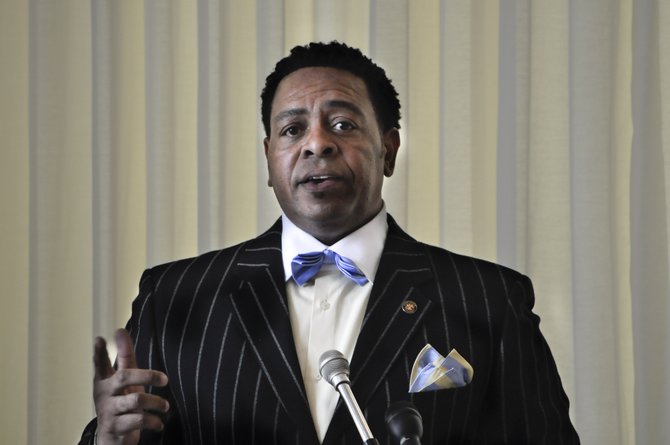State Sen. Kenny Wayne Jones, D-Canton, admits that a so-called “keep away the gays” bill that passed the Senate unanimously needs work. Photo by Trip Burns.
After years of underfunding public education in Mississippi, teachers are finally getting some love from the state Legislature. But in a way, the educators are a bit like children caught in the middle of a bitter custody bitter, with both parents lavishing gifts trying to prove they love the child more, which is unhealthy in its own way.
That is what's going on between the state House and Senate, as both chambers have decided to make this session all about the state's woefully underpaid teachers, who represent a powerful political voice as well.
Earlier in the session, the House of Representatives voted to give teachers a $1,500 pay increase, a plan that did not appear to sit well with Lt. Gov. Tate Reeves and Gov. Phil Bryant, both of whom wanted any pay raises pegged to merit-based performance measures. The bill the House passed attempted to mollify those concerns by requiring veteran teachers to meet several benchmarks, such as joining civic organizations.
On Monday, March 3, Reeves and Senate Education Committee Chairman Gray Tollison unveiled their own plan. Reeves told the media that the plan centered on boosting starting pay to help make Mississippi more competitive with surrounding states. Currently, the starting pay for Mississippi teachers is $30,900; under the Senate plan, that would go up to $34,390 by July 2015.
"The Senate is making teachers our priority," Reeves said. That means that the $64 million pay-increase package would push other spending items off the table, including, possibly, a Mississippi state trooper school on Bryant's wish list.
In addition to the starting pay salary pay raise, the plan Reeves floated, which Tollison's committee dealt with on Tuesday, also calls for a "school recognition program," a version of a merit-based pay system. Under Reeves' bill, starting in fiscal year 2017, any school rated an "A" or a "B" under the state's accountability rating would receive $100 per student enrolled in the school to dole out in the form of raises each year.
The raises would also apply to schools that improve a letter grade from year to year. Schools would have the discretion, and if they cannot come up with a plan, the money would be evenly split, Reeves said.
Nancy Loome, speaking to reporters after Reeves unveiled his plan, said it was good news that the House and Senate are talking about teacher raises and called Reeves' plan "a step in the right direction."
Black Caucus Staffs Up
Last week, the Mississippi Legislative Black Caucus asked U.S. Attorney General Eric Holder to block Mississippi's voter ID, which goes into effect this summer.
Black legislators said that the requirement would disproportionately affect African Americans, one of the groups studies reveal are less likely to have government-issued photo IDs. African American and civil-liberties groups opposed the push to put the issue of voter ID on state ballots in 2011, but it passed easily in a referendum. The DOJ was reviewing the state's plan to implement voter ID when the U.S. Supreme Court struck down key provisions in federal law that previously served as a stopgap against discriminatory election practices in states like Mississippi.
On March 3, speaking to the Stennis Capitol Press Forum about the LBCs legislative agenda, black caucus Chairman Sen. Kenny Wayne Jones, D-Canton, said black lawmakers are developing a team of attorneys who could file lawsuits to block potentially discriminatory proposals of the state Legislature; currently, Jones said the caucus relies too heavily on the state NAACP's lawyers.
Jones also said that Mississippi should look to casinos and a statewide lottery as potential revenue generators. He also addressed the fact that the entire Senate voted for a bill that adds the words In God We Trust to the state seal, but critics say also opens the door to discriminate against minorities. "The Religious Freedom Restoration Act was vague," Jones said. "We're going to have to deal with it conference (committee)."
A Question of Death
Attorneys for death-row prisoner Michelle Byrom filed a Public Records Act complaint in Hinds County Chancery Court on Monday. Byrom to compel prison officials tell Byrom what drugs it plans to use to kill her. Mississippi typically uses a combination of pentobarbital (an anesthetic), Pavulon (a muscle relaxer), and potassium chloride (which causes cardiac arrest). However, foreign manufacturers of pentobarbital have stopped selling it to American states that plan to use it for executions, creating a shortage and prompting some states to slow its rate of executions.
Death-penalty opponents have complained that Mississippi has not been forthcoming about its supply of execution drugs, specifically the expiration dates and its suppliers. "If the authorities in Mississippi are confident that they have legally obtained these drugs and that the public supports their use to carry out executions, then why are they afraid to answer these questions?" asked Vanessa Carroll, an attorney with the New Orleans office of the MacArthur Justice Center.



Comments
Use the comment form below to begin a discussion about this content.